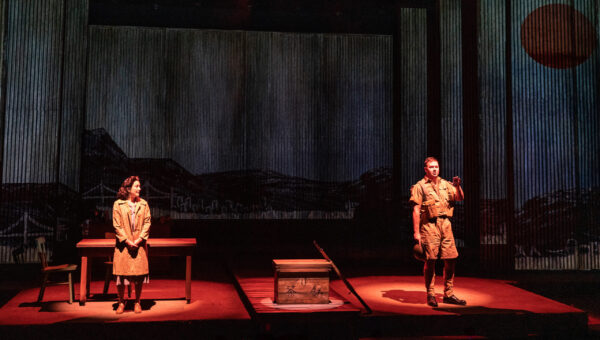Mark Sakamoto’s Forgiveness started as an essay for The Globe and Mail and then expanded into a book entitled Forgiveness: A Gift from My Grandparents. This book was then adapted for the stage by Hiro Kanagawa and had a joint world premiere at The Arts Club Theatre Company in Vancouver and at Theatre Calgary. It’s a rolling world premiere, so there have been changes to the production since it was on stage in Vancouver. It’s a play that still needs some tightening up, running a total of 3 hours. Forgiveness has a story rooted in the devastation and horrors committed against Japanese Canadians in Canada, and Canadian soldiers in Japan. This examination of the past, with parallel stories, is important. With the recent rise of hate towards the trans community and the anti-drag laws being passed in the States, looking at our collective past shows us lessons in our stories. It shows us how singling out one group of people and committing horrors against them, creates trauma that is felt for generations.
The play tells of Mitsue Sakamoto (Yoshie Bancroft), the narrator of the story along with Ralph MacLean (Griffin Cork). Their stories run parallel taking place from 1937 until they meet in 1968. T`hey meet over a meal cooked by Mitsue as her son Stan (Daniel Fong) is dating Ralph’s daughter Diane (Allison Lynch). We meet the Sakamoto family as they are preparing for the MacLean family to come over for dinner, and the timeline moves forward from there. We then see both Mitsue and Ralph in 1937, as he is signing up to be a soldier to get away from his alcoholic father (Jerod Blake), and she is growing up with her friend Miyoko (June Fukumura). Both main characters experience hardship growing up in Canada, Ralph with his family life and Mitsue losing her friend to tuberculosis at a young age.
Ralph is a man of values even at a young age. When his friends Cooper (Fionn Laird) and Deighton (Jacob Leonard) engage in xenophobic behaviour towards Japanese Canadians, Ralph is the one that steps in. When he fights in the war, he loses those same dear friends tragically and this haunts him for a very long time. Ralph winds up in a prisoner of war camp in Hong Kong, surrounded by disease and destruction. He is the only survivor of his troop, along with his commanding officer (Blake). The camp is its own special hell and the play does an amazing job of capturing this horror. It is hard to watch.
Meanwhile, back in Canada in 1942, Mitsue and her family are forced to leave the coast of BC, to concentration camps where they live in barns, like animals. She is with her mother (Manari Hara) separated from her husband Hideo Sakamato (Kevin Takahide Lee) and her father (Jovanni Sy). They live like this for years, before they are reunited with the men and decide to work, picking beets, for very little money, in Coaldale, Lethbridge. They work for a farmer, Mrs. Rutt (Alana Hawley Purvis) and stay in a chicken coop. Mitsue is pregnant and also suffers tragic loss while in this hell of her own that lasts so long after the bombs are dropped on Japan.
It all takes place on a simple stage, with raised parts of the stage, that helps to divide the stories. There is a backdrop where Cindy Mochizuki and Sammi Chien’s video and projection design situated the story, with its changing timeline. John Webber’s lighting design and Joshua D. Reid’s sound design shines in telling the war stories and letting the audience fill in the blanks on stage. Joanna Yu’s costume design also is an added layer to the storytelling, pushing Mitsue and Ralph in the past, and driving them into the present of the 70s. Fong’s fashionable pants and hair is a highlight while all the wigs on the women look awkward, especially Bancroft’s, which proves to be a distraction during the production. The performances from all the cast is what makes Forgiveness poignant. Cork is a standout performance and every time he’s on stage as his older self, I wonder if he has additional makeup or a drastic costume change. He doesn’t. He embodies his character of Ralph so well, that his transformation in age happens on stage, every time. Bancroft is a strong narrator, who carries Mitsue’s story with confidence. The entire cast plays multiple roles, in different timelines. Forgiveness is an epic production in that way. Hawley Purvis and Fong are especially versatile and Sy’s performance is lovely. Hara’s performance in every role is deep and nuanced. There is depth of talent in this production.
The play is centered on the horrors of war, but it completely misses the bright opportunity to explore the space between the end of the war and the dinner between the MacLeans and Sakamotos. The gem of the story lies in that space, where both narrators let go and forgive the world for their trauma. I want to know more about that, I want to know how they got there and learned to continue to find the capacity to love. In its current state, this play misses this opportunity and it’s this aspect of the narrative that sets it apart from every other story about war out there.
Theatre Calgary’s Forgiveness runs until April 1st. More information is available online.
Photo: (l to r) Yoshie Bancroft, Griffin Cork in Forgiveness. Credit: Moonrider Productions.

